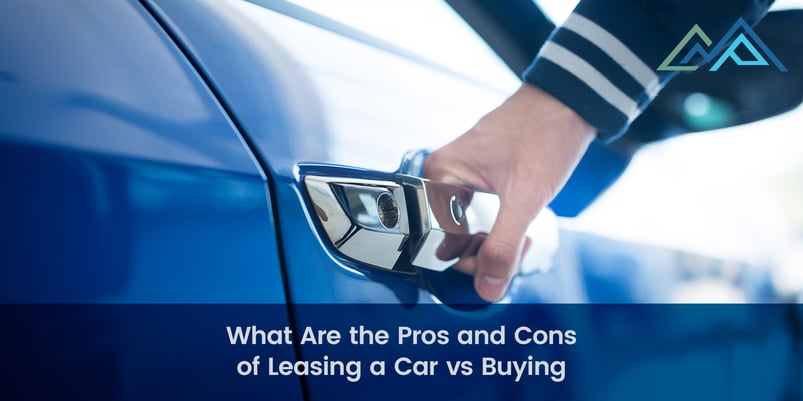Shopping for a car is something that many people dread. Even if you’re knowledgeable about cars, it can still be a hassle to deal with pushy salespeople, high prices, and financing.

At CMPP in Utah, we think it’s important to consider all your options before any major purchase. One of the most common questions we get from our clients is whether it’s better to lease a car or buy one.
There’s no one-size-fits-all answer to that question. What works for one person may not be ideal for another – and the decision you make can affect your cash flow and your taxes.
With that in mind, here are the pros and cons of leasing a car versus buying one.
The Pros and Cons of Leasing a Car
Let’s start with leasing a car, which can be an attractive option for some people. Depending on your financial situation, you may want to consider a lease in lieu of buying a new car. Here are the pros of leasing your next car:
- The monthly payments for a lease are often lower than those for an outright purchase. If you’re someone who is on a tight monthly budget, then you may prefer to keep your payment as low as possible.
- You may be able to afford a higher-priced car with more of the features you want. When you add features to a car, the price goes up. Leasing can make it feasible for you to get that car with the seat warmers and moon roof – even if you couldn’t afford the loan to buy it.
- Leased cars typically have excellent manufacturer’s warranties – and in some cases, they may be better than the warranty you’d get with a car you bought.
- With a leased car, you’ll be driving a late-model vehicle during (only) the best years of its life. You’ll be able to trade it in at the end of your lease and upgrade to a newer, better car without worrying about the trade-in value.
- Leasing a car can help you establish your credit and make it easier to buy a car (or a home) in the future.
- You may not need to make a down payment.
- There are tax advantages for business owners who lease cars.
As you can see, there are quite a few advantages to leasing a car. However, there are disadvantages as well. Here’s what you need to know:
- Your payments may be based on the full Manufacturer’s Suggested Retail Price (MSRP) and some car dealerships may try to hide this fact from you.
- Leases sometimes come with low mileage limits that make them disadvantageous for people who do a lot of driving.
- Insuring a leased car is often more expensive than insuring a car you own.
- You’ll need to put down a security deposit in most cases, and depending on the dealer, you may have difficulty getting it back.
- There may be hidden or confusing fees in the contract. It’s common for leasing contracts to be convoluted. Make sure you understand what you’re signing.
- You can’t customize your vehicle. It must be returned to the dealer in the same condition as when you received it. That means you won’t be able to paint it or upgrade your CD player.
- Finally – and most importantly – you will likely end up paying more in the long run if you lease a car than if you own it. At the end of your lease, you’ll need to lease a new car. If you buy one, you’ll own it outright after you’re finished with your payments.
Leasing may be right for you, but be sure to review your leasing agreement carefully and get clarification of anything you don’t understand.
The Pros and Cons of Buying a Car
Now, let’s talk about buying a car. There are some significant advantages to doing so. For example:
- You’ll have ownership of your car at the end of your loan term. Cars depreciate, but for many people, it’s worth making monthly payments to gain equity in your vehicle. You won’t be required to lease a new vehicle because you’ll own the one you bought.
- You can customize your vehicle in any way you choose. Some people are content to drive the car in the same condition it came off the lot. Others want the freedom to add things like new rims, new paint, and upgraded interiors. When you own a car, you can do what you want with it.
- There’s no mileage limitation. You won’t need to worry about going over your limit and you’ll be free to drive wherever you want, whenever you want.
- Your car insurance will be less expensive than if you leased a car. Insurance companies tend to charge more for leased cars. The lower monthly payment on a leased car may be inconsequential when you add in higher insurance costs.
- You can acquire trade-in or resale value. If you buy a new car in the future, your existing car’s Kelley Blue Book value can be used to offset the expense of your next car.
- You won’t have any lease-end costs.
While the benefits to buying a car are significant, there are a few potential downsides to doing so. For example:
- When you want a new car, you’ll need to handle the sale or trade-in on your existing car. You won’t be able to simply drive onto the lot and hand over the keys the way you would with a lease.
- Your monthly payments will be higher than they would with a lease. (Although, as we mentioned earlier, you’ll likely save on insurance, which can offset the difference.)
- You’ll be responsible for post-warranty repairs. With a leased car, your lease term may coincide with the warranty. With a car you buy, you’ll be on the hook for repairs from the moment that the manufacturer’s warranty expires.
If you have the ability, buying a car can be a strong financial decision, but the potential hang-ups must be considered carefully.
Which Option is Best for You?
So, which option is best for you? Buying or leasing?
For most individuals, buying a car is going to be the best option. You’ll pay a bit more on a monthly basis, but you’ll pay less in the long term if you buy. You’ll also save money on car insurance and benefit from the trade-in value of your car.
However, some people may prefer a lease. If you’re the kind of person who likes to be driving a late-model car all the time, it might be worthwhile to trade off the higher costs against the advantages of always having a new car and not worrying about long-term upkeep.
As we mentioned earlier, there are tax advantages for businesses that lease cars. For example, if you’re self-employed, you can deduct your lease expenses if you use your car for business. You’ll need to prorate the deduction if you also use the car for personal transportation.
Likewise, lease payments are deductible for businesses whereas only the interest is deductible if you buy the car. If you want to claim a depreciation credit, you’ll need to buy the vehicle.
Finally, mileage limits are a big concern for businesses in Utah. If you’ll be driving the car yourself, you may be comfortable with a lease since you can control the mileage. However, with an employee driving, it may be difficult to control the mileage and you can be penalized if you go over.
CMP Can Help You Navigate This Decision Today
In most cases, it’s preferable to buy a car rather than leasing. However, if you want the tax deduction of the lease payments and prefer driving a new car, then leasing may be the best choice for you.
Not sure which option is best for you? CMP offers a range of services and can help you understand the tax advantages of leasing vs. buying a car.
















